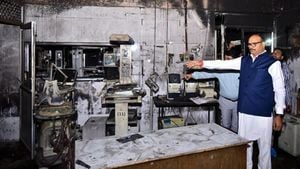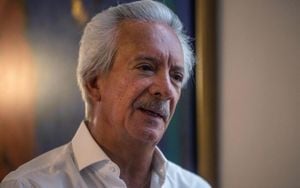Thirty years later, the Menendez brothers, Lyle and Erik, continue to captivate public interest as their notorious case gains renewed attention amid discussions of potential release. Once sentenced to life imprisonment for the 1989 murders of their parents, José and Kitty Menendez, they now stand at the crossroads of hope and uncertainty as their legal circumstances could shift dramatically.
Recently, Bryan Freedman, the attorney representing the brothers’ extended family, expressed optimism about their potential to be “home for Thanksgiving.” Freedman's sentiment, as reported by The New York Post, encapsulates the emotional stakes surrounding the case. He remarked, “I certainly pray. I’m an optimistic person. I actually hope they’re home for Thanksgiving.”
Yet, the pathway to freedom remains fraught with hurdles. Following the recent election, the Menendez brothers’ hopes were complicated by the incoming district attorney, Nathan Hochman, who aims to review the case’s merits before their scheduled resentencing hearing this December. This review period raises questions about the potential delay of any decision, leaving the brothers’ future hanging.
Los Angeles County District Attorney Gil Gascon, who previously supported the brothers’ resentence to allow for possible parole, was ousted from office, casting uncertainty over the brothers' fate. During his tenure, Gascon had indicated he might recommend changing their convictions from first-degree murder to lesser charges, which would make them eligible for parole. Notably, Gascon said, “I believe they have paid their debt to society,” which marked a significant shift from the previous narrative surrounding the brothers’ actions.
The Menendez brothers’ case is infamous, marked not only by the brutality of the murders but also by the complex web of familial abuse allegations. The brothers claimed self-defense, citing years of sexual abuse at the hands of their father. This narrative of abuse gained traction with recent media portrayals, including several documentaries and dramatized series, which illuminated the trauma they endured as children.
November brings new conflicting developments as Hochman has confirmed his intention to thoroughly review thousands of pages of confidential prison files and trial transcripts. He stated, “I am not in a position to tell you today how I will come out on any aspect of the Menendez case,” though he acknowledged the case’s importance for all involved.
Public sentiment has begun to shift as well, partly spurred by renewed media interest. Peacock’s recent docuseries Menéndez + Menudo: Boys Betrayed has ignited debate and support for the brothers' claims of abuse, as it features testimony from former Menudo band member Roy Rosselló who accuses José Menendez, their father, of sexual abuse. This aligns closely with the defense's long-held statements about family suffering, significantly complicates the prosecution's portrayal of the brothers as mere heirs seeking financial gain.
Despite the somber history, the Menendez brothers have maintained their hope for clemency, even appealing to California's Governor Gavin Newsom for relief. Gascon backed this bid for clemency, emphasizing the “credible” evidence of abuse they suffered under parental care, which many now view as fundamental to their defense. The gravity of this new information, coupled with public discourse, now influences perspectives on the brothers' guilt or innocence.
Through all the turmoil, one thing has remained constant: the Menendez brothers strive to convey their side of the harrowing events of the past. They are ready to share what they believe has not been fully addressed. “So much hasn’t been told,” they say, and with the forthcoming Netflix documentary titled The Menendez Brothers, they aim to illuminate their perspectives and clarify misconceptions about their lives and the gruesome allegations surrounding their crime.
There is also the complication surrounding Hochman’s assumption of office. Should he request additional time to study the case, it may significantly delay any decisions or recommendations, pushing back the timeline for potential freedom. Hochman himself acknowledged the case's complexity and public interest, saying, “This case is too important to delay more than necessary.”
While they hope their long-standing sentences may finally bend toward justice, supporters are left waiting with bated breath. Could the Menendez brothers finally see freedom? Will they be able to meet family over Thanksgiving? Time can only tell. It’s clear the case has come full circle; once just snippets on the tabloid front pages, they’re now part of discussions on systemic abuse, justice, and healing for victims of familial violence.
Conversations about their future have opened up debates about the treatment of juvenile offenders and the capacity for rehabilitation after traumatizing events. With Hochman’s impending review and the shifting public perspective fueled by media attention, the Menendez brothers’ paths toward possible release seem both closer and more complex than ever.
It seems there's never been another case like this—one so fraught with emotion, so interwoven with claims of deep trauma and the horrifying legacy of violence. The Menendez brothers remain hopeful, and as the Thanksgiving holiday approaches, their future hangs precariously close to negotiation, debate, and familial love, held together only by time's unyielding march.



